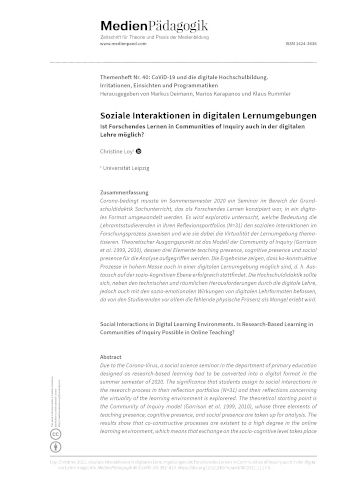Abstract
Due to the Corona-Virus, a social science seminar in the department of primary education designed as research-based learning had to be converted into a digital format in the summer semester of 2020. The significance that students assign to social interactions in the research process in their reflection portfolios (N=31) and their reflections concerning the virtuality of the learning environment is explorered. The theoretical starting point is the Community of Inquiry model (Garrison et al. 1999, 2010), whose three elements of teaching presence, cognitive presence, and social presence are taken up for analysis. The results show that co-constructive processes are existent to a high degree in the online learning environment, which means that exchange on the socio-cognitive level takes place successfully. However, in addition to the technical and spatial challenges posed by online courses, university teaching should also consider the socio-emotional effects of digital teaching formats as students depreciate in particular their lack of physical presence.
References
Anderson, Terry, Liam Rourke, D. Randy Garrison, und Walter Archer. 2001. «Assesing Teaching Presence in a Computer Conference Context». Journal of Asynchronous Learning Networks, (5)2, 1–17. https://cde.athabascau.ca/coi_site/documents/Anderson_Rourke_Garrison_Archer_Teaching_Presence.pdf.
Biocca, Frank, Chad Harms, und Judee K. Burgoon. 2003. «Towards a More Robust Theory and Measure of Social Presence: Review and Suggested Criteria». Presence 12, 456–480. https://doi.org/10.1162/105474603322761270.
Bundesassistentenkonferenz. 1970/2009. Forschendes Lernen. Wissenschaftliches Prüfen. Schriften der Bundesassistentenkonferenz. 5. Neuauflage nach der 2. Aufl. 1970. Bielefeld: UniversitätsVerlag Webler.
Cui, Guoqiang, Barbara Lockee, und Cuiqing Meng. 2013. «Building Modern Online Social Presence: A Review of Social Presence Theory and Its Instructional Design Implications for Future Trends». Education and Information Technologies 18 (4): 661–85. https://doi.org/10.1007/s10639-012-9192-1.
Garrison, D. Randy, Terry Anderson, und Walter Archer. 1999. «Critical Inquiry in a Text-Based Environment: Computer Conferencing in Higher Education». The Internet and Higher Education 2 (2): 87–105. https://doi.org/10.1016/S1096-7516(00)00016-6.
Garrison, D. Randy, Terry Anderson, und Walter Archer. 2010. «The First Decade of the Community of Inquiry Framework: A Retrospective». The Internet and Higher Education, Special Issue on the Community of Inquiry Framework: Ten Years Later, 13 (1): 5–9. https://doi.org/10.1016/j.iheduc.2009.10.003.
Herzig, Bardo. 2005. «Die Bedeutung der (Allgemeinen) Didaktik für das Lehren und Lernen in virtuellen Räumen». In Jahrbuch Medienpädagogik 4, herausgegeben von Ben Bachmair, Peter Diepold, und Claudia de Witt, 4:17–42. Jahrbuch Medienpädagogik. Wiesbaden: VS Verlag für Sozialwissenschaften. https://doi.org/10.21240/mpaed/retro/2017.08.02.X.
Huber, Ludwig. 2009. «Warum Forschendes Lernen nötig und möglich ist». In Forschendes Lernen im Studium. Aktuelle Konzepte und Erfahrungen, hrsg. von Huber, Hellmer, Schneider. Bielefeld: Universitätsverlag Webler, 9–35. https://www.fh-potsdam.de/fileadmin/user_upload/forschen/material-publikation/Huber_Warum_Forschendes_Lernen_noetig_und_moeglich_ist.pdf.
Huber, Günter. 1996. «Orientierungsstile und Lernverhalten von Studierenden». In Lehr- und Lernprobleme im Studium. Bedingungen und Veränderungsmöglichkeiten, hrsg. von Lompscher und Mandl. 1. Auflage. 70–85. Bern u. a.: Verlag Hans Huber.
Kalcsics, Katharina, und Markus Wilhelm. 2017. «Lernaufgaben gestalten». In Lernwelten – NMG Studienbuch 1. und 2. Zyklus. Natur – Mensch – Gesellschaft. 81–90. Bern: Schulverlag.
Koch-Priewe, Barbara. 2013. «Das Portfolio in der LehrerInnenbildung – Verbreitung, Zielsetzungen, Empirie, theoretische Fundierungen». In Portfolio in der LehrerInnenbildung. Konzepte und empirische Befunde, hrsg. von Barbara KochPriewe u. a. 40–73. Bad Heilbrunn: Verlag Julius Klinkhardt.
Kreijns, Karel, Frederik Van Acker, Marjan Vermeulen, und Hans Van Buuren. 2014. «Community of Inquiry: Social Presence Revisited». E-Learning and Digital Media 11 (1): 5–18. https://doi.org/10.2304/elea.2014.11.1.5.
Kuckartz, Udo. 2018. Qualitative Inhaltsanalyse. Methoden, Praxis, Computerunterstützung. 4. Auflage. Weinheim, Basel: Beltz Juventa.
Oh, Catherine S., Jeremy N. Bailenson, und Gregory F. Welch. 2018. «A Systematic Review of Social Presence: Definition, Antecedents, and Implications». Frontiers in Robotics and AI 5: 114. https://doi.org/10.3389/frobt.2018.00114.
Reinmann, Gabi, und Heinz Mandl. 2006. «Unterrichten und Lernumgebungen gestalten». In Pädagogische Psychologie, hrsg. von Andreas Krapp und Bernd Weidenmann. 5. Vollständig überarbeitete Auflage. 614–657. Weinheim, Basel: Beltz Verlag.
Rourke, Liam, Terry Anderson, D. Randy Garrison, und Walter Archer. 1999. «Assessing Social Presence In Asynchronous Text-Based Computer Conferencing». International Journal of E-Learning & Distance Education / Revue Internationale Du E-Learning Et La Formation à Distance 14 (2), 50-71. http://www.ijede.ca/index.php/jde/article/view/153.
Rourke, Liam, und Heather Kanuka. 2009. «Learning in Communities of Inquiry: A Review of the Literature (Winner 2009 Best Research Article Award)». International Journal of E-Learning & Distance Education / Revue Internationale Du E-Learning Et La Formation à Distance 23 (1), 19-48. http://www.ijede.ca/index.php/jde/article/view/474.
Sonntag, Monika, und Julia Rueß. 2018. «Wie können Studierende zum eigenständigen Forschen motiviert werden? Erfahrungen aus den Q-Tutorien an der Humboldt-Universität zu Berlin». In Forschendes Lernen, hrsg. von Judith Lehmann und Harald Mieg. 20–35. Verlag der Fachhochschule Potsdam.
Gunawardena, Charlotte N. 1995. «Social Presence Theory and Implications for Interaction and Collaborative Learning in Computer Conferences». International Journal of Educational Telecommunications 1(2), 147-166. Charlottesville, VA: Association for the Advancement of Computing in Education (AACE). https://www.learntechlib.org/primary/p/15156/.
Walther, Joseph B. 1992. «Interpersonal Effects in Computer-Mediated Interaction: A Relational Perspective». Communication Research 19 (1): 52–90. https://doi.org/10.1177/009365092019001003.
Wildt, Johannes. 2005. «Auf dem Weg zu einer Didaktik der Lehrerbildung?». Beiträge zur Lehrerbildung 23 (2), 183–190. https://doi.org/10.25656/01:13571.
Winter, Felix. 2013. «Das Portfolio in der Hochschulbildung – Reformimpulse für Didaktik und Prüfungswesen». In Portfolio in der LehrerInnenbildung. Konzepte und empirische Befunde, hrsg. von Barbara Koch-Priewe u. a. 15–40. Bad Heilbrunn: Verlag Julius Klinkhardt.

